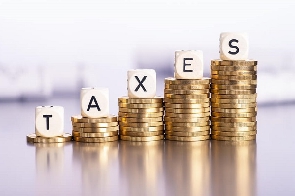Under the current administration of President Nana Addo Dankwa Akufo-Addo, a number of “new taxes” have been introduced which has raised the cost of living and impacted on livelihoods.
While government believes these taxes are necessary for development, the rate at which they are introduced has become opposite of the promises the New Patriotic Party made before assuming office in 2016.
In addition to these new taxes introduced, some old taxes have been amended to broaden the tax net and increase the country’s domestic tax base.
On March 31, 2023, Parliament passed some amended tax bills that are waiting to be assented by the President.
According to the Ghana Revenue Authority, Parliament passed three new tax laws and amended two existing laws to be implemented.
Some of these taxes have been kicked against by cross section of Ghanaians, CSOs, lawmakers who believes these taxes will only compound the woes of citizens which are already grappling to make ends meet.
GhanaWeb Business takes a look into the number of taxes introduced by the governing NPP under Akufo-Addo thus far.
Penalty and Interest Waiver Act, 2021 (Act 1065)
A waiver of penalties and interests on accumulated tax arrears up to December 2020 for persons who make arrangements to pay the principal tax.
COVID-19 Health Recovery Levy Act, 2021 (Act 1068)
This Act imposes a one percent levy on the supply of goods and services made in the country other than exempt goods or services; and import of goods and services other than exempt imports. The Levy also applies to the supply of goods subject to the VAT Flat Rate.
The COVID-19 Health Recovery Levy is not allowable as an input tax deduction
Financial Sector Recovery Levy Act, 2021 (Act 1067)
This Act imposes a five percent levy on the profit before tax of banks. The tax is payable in quarterly installments.
Energy Sector Levy (Amendment) Act, 2021 (Act 1064)
This amendment has added two additional sections, 5A, and 5B.
5A entails the imposition of an Energy Sector Recovery Levy of GH¢20 pesewas per litre of petrol/diesel and 18 pesewas per kg on Liquefied Petroleum Gas (LPG) while 5B entails the imposition of a Sanitation and Pollution Levy of GH¢10 pesewas per litre of petrol and diesel respectively.
Income Tax (Amendment) Act, 2021 (Act 1066)
This Act amends the Sixth Schedule to the Income Tax Act 2015 and provides for a 30 percent rebate of income tax due for the second, third, and fourth quarters of 2021 for taxpayers in the following areas – accommodation and food, education, travel and tours, and arts and entertainment sectors
Electronic Transaction Levy
This is a 1% levy on electronic transactions above GH¢100 which was passed in 2022. Ahead of this revised rate, government had imposed a 1.5% charge on all electronic transactions.
Minimum Chargeable Income Taxation
This is a turnover tax at 5% applicable to businesses declaring losses consistently for the past 5 years but is inapplicable to farming businesses and businesses in their first 5 years of operation.
New Income Tax for Companies involved in Lottery, Betting & Games of Chance
This is a new 20% income tax which is imposed on the income of the "gross gaming revenue” of betting, lottery, and gaming companies
Withholding Tax on Winnings from Betting, Lottery & Games of Chance
Betting, lottery, and game of chance winnings will now be subject to a 10% withholding tax at the point of payout
Unified Loss Carry Forward Position
All businesses can now carry forward their losses for 5 years. This used to be 5 years for only priority sector businesses and 3 years for all others.
Foreign Exchange (FX) Loss
FX losses of a capital nature not deductible - can now be capitalized and granted a capital allowance.
New Tax Return for Realisation of Assets & Liabilities
After realizing an asset or liability, a person must now file a tax return with the GRA within 30 days.
Pension-Related Tax Exemption for 2023
Withdrawals from a Provident Fund or Personal Pension Scheme before the statutory retirement age) due to loss of employment, COVID-19 or the current economic hardship are exempt from tax in 2023
New Income Tax for Companies in Lottery, betting, and Games of Chances
A new 20% income tax was introduced on the gross gaming revenue of betting, lottery, and gaming companies.
Withholding Tax on Realisation of Assets & Liabilities
A new withholding tax of 3% (for residents) and 10% (for non-residents) applies on the consideration received on realisation of assets and liabilities.
Changes in Motor Vehicle Benefit for Employees
Employees who receive motor vehicle benefits will see an increase in the taxable cap. The GH¢600 cap is now GH¢1,500, the GH¢500 cap is now GH¢1,250 and the GH¢250 cap is now GH¢625. However, unrealised FX losses are not deductible. Also, resident person-to-resident person transaction-related FX losses are not deductible.
Increased Marginal Income Tax Rate for Individuals
The highest tax rate for individuals has been increased to 35% for annual incomes exceeding GH¢600,000. It was previously capped at 30% for annual incomes exceeding GH¢240k.
Growth & Sustainability Levy (GSL) – A
A new GSL has been introduced to replace the 5% National Fiscal Stabilisation Levy (NFSL). The GSL has a very expanded scope and will apply to 3 categories of persons.
These categories are:
Increase in Special Elected Rate for Gifts and Gains
Individuals could previously exercise a special election of having their gifts received and gains from realisation taxed at 15%. This rate is now pegged at 25%.
Growth & Sustainability Levy (GSL) – B
The GSL. will apply to 3 categories of persons. Category A entities will pay 5% of Profit Before Tax.
Category B (the extractive industry) will pay 1% of gross production, and Category C (all other entities) will pay 2.5% of Profit before Tax.
Excise Duty Review
The Excise Duty Act has been amended to increase the excise duty rates for specified commodities and to expand the coverage of excise duty to cover some items/commodities that were previously out of the scope of the application of Excise Duty.
Watch the latest edition of BizTech and Biz Headlines below:
SSD/MA
Business News of Friday, 7 April 2023
Source: www.ghanaweb.com

















